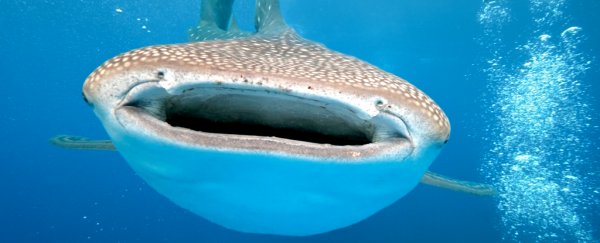Three species of sharks and three species of rays will now have extra protection wherever they go, thanks to a conservation agreement signed by 126 countries around the world.
The new agreement is a major outcome of a large wildlife summit that just concluded in Manila, Philippines, showing that key international players are finally stepping up their actions to better protect our planet's migratory animals under the sea, on land, and in the skies.
The Convention on the Conservation of Migratory Species (CMS) of Wild Animals has extended protections to whale sharks, angelsharks, dusky sharks, blue sharks, common guitarfish and the white-spotted wedgefish, all of which appear on the IUCN Red List of endangered species.
Of particular note are the endangered whale shark and the critically endangered angelshark, both of which have been added to Conservation of Migratory Species' Appendix I.
As animals in danger of extinction, they are to be offered the strongest protections available.
This means, for countries participating in the agreement, "prohibiting the taking of such species, with very restricted scope for exceptions; conserving and where appropriate restoring their habitats; preventing, removing or mitigating obstacles to their migration and controlling other factors that might endanger them," the CMS website says.
This is great news for the gentle whale shark - the largest fish species in the world. Although it is protected in many places around the world, this will extend those protections to migration hotspots such as Mozambique, Madagascar, Peru and Tanzania.
The other species have been listed on Appendix II, which means they are also entitled to international agreements for their conservation and management.
For the blue shark in particular, this has been lauded.
"Until now, no protection existed throughout [the blue shark's] entire range, and there is no management of blue shark fisheries or regulation of international trade despite approximately 20 million blue sharks being caught every year in fisheries around the globe," wrote Matt Collis of the International Fund for Animal Welfare.
"Given the failure of fisheries bodies around the world to address this problem, this Appendix II CMS listing increases the pressure for action by Regional Fisheries Management Organisations to regulate catches."
Greater protections were extended to land creatures, too. In particular, 10 Old World vulture species, leopards and lions will also get additional protections, and giraffes have been included in Appendix II for the first time. The chimpanzee is also listed on both Appendices.
"Migratory animals play a critical role in our planet's ecosystem," said Theresa Mundita Lim of the Biodiversity Management Bureau in the Philippines.
"They act as pollinators, control pests and are a source of food and income. They are also an inspiration for people here in the Philippines and all around the world."
